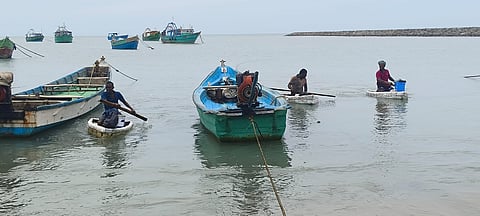

THOOTHUKUDI: Vembar fishermen who catch octopus by relying on traditional methods have raised the ante against their counterparts equipped with compressors. Hundreds of fishermen families maintaining the tradition of casting angles sitting on a thermocol float in the coastal waters feel threatened by the introduction of a new method. They consider hunting octopus underwater using compressors for breathing as illegal and dangerous.
Three types of octopus are available in the Gulf of Mannar namely Oddu Kanava (cuttlefish), Pei Kanava (octopus) and Oosi Kanava (squid), say experts.
Fishermen said over 25 thermocol floats or buoys are carried in a vallam (country boat) early in the morning and scattered in the sea by maintaining a 500 metre gap after reaching the fishing spot located 10 to 15 nautical miles off the shore for catching octopus with angles till 12 pm.
In their parlance, the underlying coral reefs, the most suitable place for fishing octopus, is known as 'par'.
Barathy, a fisherman, said the angles are tipped with the bait to lure out the octopus dwelling in the coral reefs. "It is a primitive method, but they are caught without affecting the underwater ecosystem," he said.
Another fisherman Andrews claimed that fishers on thermocol floats manage to catch not more than two to three kg of octopus earning them over Rs 1000 a day.
A kilogram of Oddu Kanava fetch them Rs 500 to Rs 650 per kg, Pei Kanava Rs 550 to Rs 600 per kg, and Oozi Kanava may provide Rs 400 to Rs 500 per kg based on the day's demand.
Vergin, a fisherman from Vembar, told TNIE that their livelihood has been affected by fishermen equipped with compressors who dive underwater to catch octopus.
"A country boat with 25 buoys, brings about 120 kg of octopus in a day earlier. Nowadays, the catch has been reduced drastically to 60 to 70 kg due to excessive and unlawful fishing practices. Since the number of boats equipped with compressors are increasing gradually in octopus fishing areas, we are worried about the dwindling resources and reduced livelihood means", Vergin said.
"For the past two years, 14 Vembar boats with compressors have been catching 1.7 tonnes of octopus per day. In addition, fishermen from Thoothukudi and Mundhal have joined them, taking the count to 25, which has been fast eroding the resources, he added.
The compressors are an advanced device for breathing but with health hazards which remain unknown, a fishermen leader said.
At least 500 families in Vembar depend on catching octopus as their major source of income, with sizeable numbers in Periyasamypuram, Tharuvaikulam, Mottai Gopuram, and Inigo Nagar also doing the same. Fishermen in Vaippar and Chippikulam engage in octopus fishing by utilising 'chart valai' (a mesh).
Fishermen leaders have urged the district fisheries officials to put a stop to the illegal practice which adversely impact the livelihood of hundreds of traditional fishermen. The Assistant Director of Fisheries, authorised to issue licenses for chank divers, has warned the illegal fishers to stop catching octopus and only to collect conch shells, they said.
It is learnt that the fishermen who hold license for chank diving, have their boats equipped with compressors, and engage in fishing octopus against the permit of their license, said sources. The state government has not permitted the use of compressors for any fishing activities.